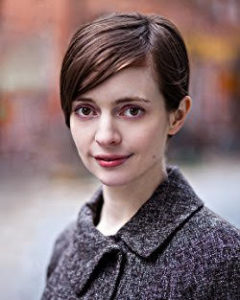By Christa Rodriguez || Campus Life Editor

This past Wednesday, September 13, F&M welcomed Emily St. John Mandel to campus. Her most recent novel, Station Eleven, is one of three other novels the author has published. She has received numerous awards for Station Eleven as well as for other works of fiction. She is also a staff writer for The Millions.
Peter Merani ‘18 advocated for her visit to campus after reading her most recent novel and feeling inspired. He worked with the Philadelphia Alumni Writer’s House to make her visit a reality. St. John Mandel’s visit consisted of a question and answer session at the Writer’s House and a reading of excerpts from Station Eleven at Ware College House later that night. The events were co-sponsored by the English Department, the Program in Women’s Gender, and Sexuality Studies, Phillips Museum of Art, Ware College House, and the Public Health Program.
During St. John Mandel’s Q&A session, attendees had the opportunity to ask her about her novel, her life, or craft in general. When asked about her use of multiple protagonists in her novel, she stated that she has “always been really interested in writing about group dynamics.” This is something that became a point of interest for her from her life experiences. St. John Mandel revealed that, for Station Eleven, she had always wanted to use multiple characters, but ended up adding more as she went along. Among all the characters in her novel, the opening focuses on one particular character named Arthur who dies of a heart attack in the first couple of pages.
When asked about this narrative choice, she explained that she had always had Arthur as part of her book and always wanted him to die. The inspiration for the character came from reading an anecdote of an actor dying of a heart attack in the fourth act of King Lear.
When writing Station Eleven, St. John Mandel was interested in “the technology that surrounds us in the present,” and the idea of the post-apocalyptic story came out of the idea to create contrast between the current world and one without technology. However, she was not interested in the horror and violence that would likely happen right after an apocalyptic event, but rather what happens 15-20 years after things have calmed down. This allowed her to focus on art in the post-apocalypse timeline, which occurs after a flu pandemic. When asked about her decision to include a traveling orchestra and theater troupe that performs Shakespeare, she said, “the arts are what remind us that we’re human.”
In terms of craft, St. John Mandel said she personally does not usually start her creative works with an outline. Rather, the full first draft, as bad as it may end up, is written first before she goes back and constructs an outline.
She confessed, “my first rough drafts are always a complete train wreck.” However, she noted that there is no “right” way to start a novel, and that people do it in different ways successfully.
It seems the greatest challenge in her writing process was the multiple timelines in Station Eleven. This was used to build tension as well as to juxtapose the present day with the post flu world. In using this stylistic choice with her timelines, she advised that even if the two timelines in a novel are separate stories, they still must have the same thematic end. She took her novel apart and put it back together again countless times over the span of three years to get to the finished product.
One attendee asked her advice for young writers starting out. “Finish what you start,” she said. To St. John Mandel, it is easy to get bored with your writing and give up, but pushing through helps one become a better writer. For example, St. John Mandel wrote all four of her novels with a day job and was able to train herself to write under any condition to get her work finished. Going more specific into how she found the time to write, she described what she called “social ruthlessness.” This is having the self discipline to tell people you have plans when you are invited to social gatherings, which would just be to write. She also advised that one does not need an MFA or specific qualifications to get published. She personally does not hold an MFA in creative writing. “Don’t assume that the publishing world is closed to you,” she said, as most agents and publishers care about are if you are a good writer or not.
With her visit to campus, Emily St. John Mandel provided further insight into her work as an author as well as advice to aspiring writers.
Junior Christa Rodriguez is the Campus Life editor. Her email is crodrigu@fandm.edu.